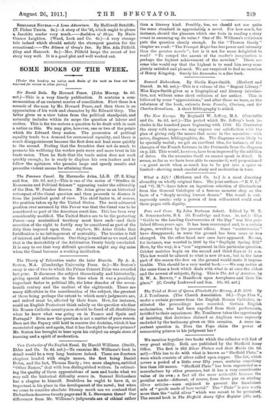Two Centuries of the English Navel. By Harold Williams. (Smith,
Elder and Co. 7s. 6d. net.)—To examine Mr. Williams's book in detail would be a very long business indeed. There are fourteen chapters headed with single names, the first being Daniel Defoe, and the last, Thomas Hardy ; two more chapters, entitled "Other Names," deal with less distinguished writers. In estimat- ing the quality of these appreciations of men and books what we may call the historical difficulty comes in. Samuel Richardson has a chapter to himself. Doubtless he ought to have it, so important is his place in the development of the novel ; but when we come to consider absolute literary merit can we contend that Richardson deserves twenty pages and R. L. Stevenson three? Our differences from Mr. Williams's judgments are of ethical rather than a literary kind. Possibly, too, we should not use quite the same standard in appreciatirk a novel. For how much, for instance, should the pleasure which one feels in reading a story count in summing up its value ? One of Mr. Williams's criticisms puts the question clearly enough. In the " Thomas Hardy " chapter we read: " The Trumpet Major has less power and intensity than the greater novels "; but is it not far more delightful to. read ? " To compel the assent of the reader's imagination is perhaps the highest achievement of the novelist." There are some who would say that the highest is to send him away com- pletely satisfied and pleased. We are surprised to find no mention of Henry Kingsley. Surely his Ravenshoe is a fine book.


































 Previous page
Previous page